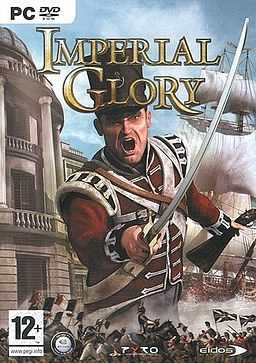Imperial Glory
| Imperial Glory | |
|---|---|
 | |
| Developer(s) | Pyro Studios(For Windows) Robosoft Technologies (For Mac) |
| Publisher(s) | Eidos Interactive, Feral Interactive (Mac) |
| Producer(s) | César Valencia Perello |
| Writer(s) | Ignacio Pérez Dolset César Valencia Perello |
| Platform(s) | Mac OS X, Windows |
| Release date(s) | 5/17/2005, 12/5/2006 (Mac) |
| Genre(s) | Real-time tactics |
| Mode(s) | Single player, multiplayer |
| Distribution | DVD |
Imperial Glory is a real-time tactics game, developed by Pyro Studios and published by Eidos, that was released to the public in May 2005. The Mac OS X version of the game was released in November 2006 by Feral Interactive.[1]
Imperial Glory is set in the Revolutionary and Napoleonic eras, between 1789 and 1815, and allows the player to choose one of the great empires of the age–Great Britain, France, Austria, Russia or Prussia–on their quest of conquering Europe, North Africa and the Middle East. The game is very similar to the Total War series: it consists of a 2-D strategic campaign resembling Medieval: Total War and Shogun: Total War and fully 3-D land and naval battles in the manner of Empire: Total War, which was released in 2009. However, unlike the Total War series up to Empire: Total War, naval battles are playable.
Units
The basic units available to the player are the same, regardless of the nation the player controls, namely, infantry, cavalry and artillery. By seizing appropriate provinces, a player may deploy other units, such as Arabian camel cavalry. The principal units (infantry, cavalry, artillery) are identical to those in the Total War series.
Infantry in Imperial Glory are represented as militia, line infantry, light infantry, grenadiers, riflemen and the player's country's elite force (e.g. British Black Watch). Cavalry consists of dragoons, hussars, lancers and an elite cavalry type (such as Life Guards for Britain), and it is possible to find such contemporary pieces of artillery as six-pounder cannons and howitzers.
In the campaign phase of the game, units are moved around the map by assigning them to a commander. Commanders bear the ranks of captain, colonel, general or field marshal. Each can command a certain number of units and be promoted to a higher rank by winning encounters with enemy units.
During naval battles, players can engage the enemy with various ships: sloops, frigates or ships of the line.
Peaceful activities
Aside from fighting, players may engage in diplomacy, including several alliance options. Many different kinds of buildings can be constructed, which can be fortified, and which give certain advantages to the player, including providing a basis for recruitment of units. Effort applied to research leads to the development of new types of units to be recruited and different buildings that may be built. Trade routes can be set up as well, either to trade with other nations or establish internal commerce.
Tactics
Unlike the Total War series of games (except Empire: Total War and Napoleon: Total War), the main weapon of the infantry is the musket, which lowers the opportunity to involve soldiers in hand-to-hand combat (players may order them to commence a bayonet charge). Hence, the tactics have to be adjusted to this new setting. The game offers a variety of unit formations, enabling players to engage in combat operations with greater efficiency.
Reception
Imperial Glory was generally received as a fair game with great potential, but with rough edges. Gamespy reported that the "system's biggest problem is that it doesn't model morale. This means that your men basically turn into mindless automatons, and not very smart ones, either" and rounded off the review with "[Imperial Glory] shows a lot of untapped promise and potential, but it also possesses raw edges and missed opportunities. This is still an enjoyable game, though, so long as you're willing to overlook the flaws." [2]
References
- ↑ "Feral Interactive: Imperial Glory".
- ↑ "Imperial Glory Review for PC". Retrieved September 16, 2010.
External links
- Imperial Glory Manual
- Official Game site
- Windows Product Page
- Mac Product Page
- Imperial Glory at Feral Interactive
- IgFansite.com
- Imperial Glory at MobyGames
| ||||||||||